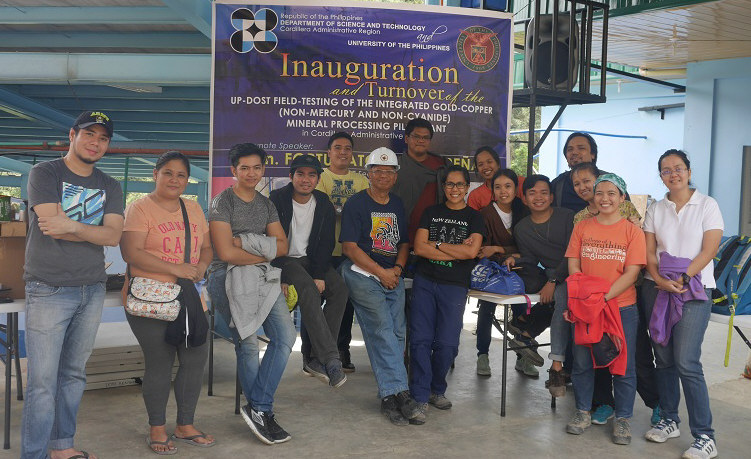 In 2017 Dr Kate Tungpalan was selected as the Minerals Engineering Journal Editor’s “Rising Star” and it isn’t difficult to understand why. Across her career, Kate has experienced the technicalities of mineral processing and the mining-community interface of small-scale mining, researched at both the Julius Kruttschnitt Mineral Research Centre (JKMRC) and W.H. Bryan Mining & Geology Research Centre (BRC), learnt geology to better engage with her PhD topic, and been awarded the prestigious Ian Morley Prize in 2014.
In 2017 Dr Kate Tungpalan was selected as the Minerals Engineering Journal Editor’s “Rising Star” and it isn’t difficult to understand why. Across her career, Kate has experienced the technicalities of mineral processing and the mining-community interface of small-scale mining, researched at both the Julius Kruttschnitt Mineral Research Centre (JKMRC) and W.H. Bryan Mining & Geology Research Centre (BRC), learnt geology to better engage with her PhD topic, and been awarded the prestigious Ian Morley Prize in 2014.
We sat down with Kate, who is now a Postdoctoral Research Fellow at the BRC, to talk through the details of her dynamic career.
From Metallurgy to Geometallurgy
“I have a Bachelor in Metallurgical Engineering and Master in Environmental Engineering, both from The University of the Philippines (UP). While I was doing my master degree I was also lecturing at UP. Even though my goal had always been to finish my masters and find a job in industry, I had a realisation that I loved teaching and researching – I enjoy working with the younger generations.
“I tend to prefer doing a variety of work, not so much doing a lot of the same each day. At university you do teaching, you do research, some admin responsibilities. I also loved having the opportunity of visiting different mines.”
“When I was finishing my masters, Professors Emmy Manlapig, David Mulligan and Mehmet Kizil were actually visiting the Philippines because they were working on a project with Xstrata Copper. At that time, Xstrata owned a large copper-gold porphyry deposit in the Philippines and were planning to involve students from the Philippines to conduct research on the deposit. I didn’t even know the details of the project, but I said ‘why not’. That brought me to UQ. “
“When I came to SMI to complete my PhD, it was focused on geometallurgy but I really didn’t have an idea of what geometallurgy actually involved. I didn’t have a background in geology. I had taken some courses on it at university but they were very basic. It was quite challenging at the beginning, especially in my first year because I was still preparing my project proposal. As I was doing that, I was also reading up on geology, which was not easy for me. I spent a lot of consultation time with Dr Luke Keeney who is the geologist in my supervisory team.
“At university I really didn’t like geology… but I have learned a lot since then and see why, as a mineral processing person, you should understand it.
“In our work, we focus on investigating the characteristics of the ore - its geological characteristics, and look at the data coming from the geologists – which engineers usually wouldn’t do – and use that data to understand why the ore behaves like it does during processing.”
An early introduction to sustainability
“As part of my scholarship, I was required to do more teaching in the Philippines after finishing my PhD. When I went back I did some teaching again but my research ended up being very different from what I had done before – it was on artisanal mining.
“Mining doesn’t have a very good reputation in the Philippines. A lot of people wanted to just shut down the industry. When they were talking about mining, most critics were talking about the negative impact on the environment and they all blame it to the big mining companies. But to my knowledge these companies are quite responsible.
“No one talks about the small-scale miners – what they do, how do they mine and what their real situation is. So our research group said ‘why don’t we help the small scale miners and maybe reduce the environmental impacts of mining and proposed a project to the government.
“The government gave us funding for a project on how small-scale miners could do their processing without using cyanide or mercury and also construct a pilot plant that would be used by the artisanal miners.

“Technically it was not that difficult. The difficult part was dealing with the people. You couldn’t just tell them to stop doing what they were doing because ‘it’s not good’, you really had to convey to them why it is not good. You have to work with them. You can’t just tell them to not use something, you have to offer them something they can use instead … You can’t force them to change their way of life all of a sudden because they have lived that way – starting from their parents and grandparents… They acknowledge that cyanide and mercury are bad for their health to some extent, but it is the only job they know. Plus they do not have the capability to look for alternatives just like what we do in research…..when you actually talked to them and put your feet in their shoes, it wasn’t that easy. For me, that project made me realise that the technical part is simple. It is the social aspect and the political aspect that are challenging and I would say immense!
“It was actually the most fulfilling project I’ve worked on so far.”
Contact Dr Kate Tungpalan about her work



